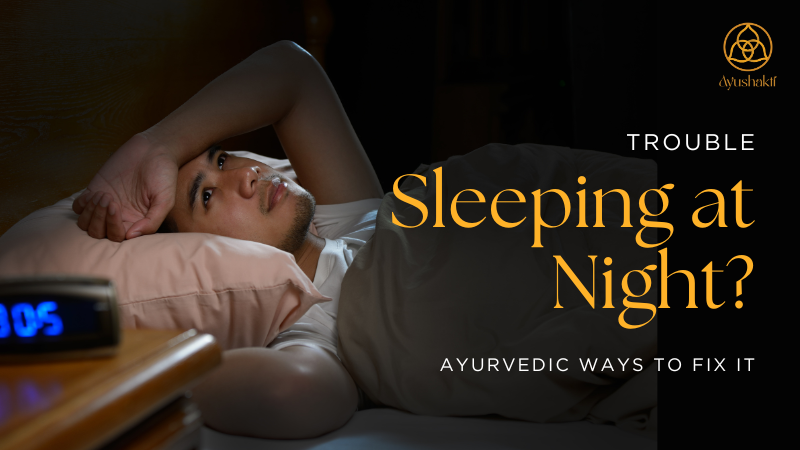
Trouble Sleeping at Night? Ayurvedic Ways to Fix it
Share
How long has it been since you woke up feeling refreshed, without an alarm clock or caffeine helping you start your day? If it’s been a while, you're definitely not alone. Recent surveys, like Resmed's Global Sleep Study, show that a third of people struggle with falling or staying asleep multiple times a week.
In today’s fast-paced world, going to bed early is almost seen as embarrassing. We live in a culture that’s always on the go, and it's having a toll on our health. Issues like obesity, Alzheimer’s, and autoimmune disorders are becoming more common as a result.
Why Is Sleep So Hard to Get?
Getting quality sleep is key to maintaining good health. It’s important for mental clarity, physical energy, and overall well-being. If you find yourself struggling to fall asleep or waking up during the night, there may be a few reasons behind it. And don’t forget to check your medications—some, like corticosteroids (prednisone), cold treatments, or certain antidepressants, can mess with your sleep.
Common Sleep Troubles
- Caffeine and Alcohol: While alcohol can help you fall asleep initially, it often leads to poor sleep later on. Caffeine, found in coffee, soda, and tea, is a stimulant and can keep you wide awake when you want to rest.
- Changing Sleep Schedule: If your routine is all over the place because of work or travel, your internal body clock can get out of sync, leading to sleepless nights.
- Late-Night Eating: A light snack is fine, but overeating before bed can cause acid reflux, making it uncomfortable to lie down and sleep.
- Health Issues: Conditions like acid reflux, chronic pain, diabetes, and even heart disease can contribute to insomnia.
- Medications: Some medications, especially antidepressants or those with stimulants, can impact your ability to sleep.
- Mental Health: Conditions like anxiety, depression, or stress often lead to insomnia. The pressure to get good sleep can also make it worse.
- Sleep Environment: A noisy, bright, or uncomfortable room can make falling asleep difficult. Plus, using electronic devices like phones and computers before bed can mess with your sleep cycle.
- Sleep Disorders: Conditions such as obstructive sleep apnea (OSA) or restless leg syndrome (RLS) can also prevent you from getting a good night’s rest.
Hormones and Sleep
Hormones play a huge role in sleep quality. Here’s how:
- Cortisol: This is your stress hormone. It should peak in the morning and decline by evening, allowing you to relax and sleep. Chronic sleep deprivation can lead to high cortisol levels at night, making it harder to rest.
- Human Growth Hormone (HGH): This hormone helps build muscle, repair tissue, and even boost fat loss. It peaks during deep sleep, so a lack of rest can impact your metabolism.
- Melatonin: Known as the “sleep hormone,” melatonin helps you feel sleepy at night. If your melatonin levels are off, it could affect your sleep cycle, especially as you age.
- Leptin & Ghrelin: Leptin signals when you're full, and ghrelin triggers hunger. Poor sleep lowers leptin and raises ghrelin, which is why you may feel hungrier after a bad night’s sleep, especially for sugary or fatty foods.
The Impact of Poor Sleep on Your Brain
Sleep is essential for your brain to function well. When you’re sleep-deprived, it affects your memory, decision-making, and ability to focus. For example, during sleep, your brain clears out toxins, including beta-amyloid, which can build up and contribute to Alzheimer’s if not properly cleared.
In short, poor sleep can make you crave junk food, slow down your brain, and even impact your long-term brain health.
Alcohol’s Role in Sleep
Even though alcohol might help you feel relaxed, it interferes with your REM sleep, which is crucial for consolidating memories. That means a drink before bed can disrupt your sleep cycle and leave you feeling hungover the next day, even if you got enough hours in bed.
How Ayurveda Sees Sleep
In Ayurveda, sleep is considered one of the key pillars of good health. Proper sleep balances your energy and helps maintain a disease-free body. In fact, lack of sleep is often linked to many health problems, so it's important to prioritize good sleep habits.
Dosha-Specific Sleep Issues
According to Ayurveda, your sleep quality can be influenced by your dosha (body type). Here’s how each dosha affects sleep:
- Vata Types: These people often have trouble falling asleep, waking up frequently, and tend to have light, irregular sleep. They may experience things like teeth grinding or sleepwalking.
- Pitta Types: Pitta individuals usually sleep lightly and may have trouble falling asleep if their minds are too active. They also tend to have vivid, fiery dreams.
- Kapha Types: Kapha people are deep sleepers and enjoy long hours of sleep. They’re prone to oversleeping, feeling sluggish, and struggling to get out of bed.
Improving Your Sleep: Tips That Actually Work
- Watch Your Caffeine: Keep track of how much caffeine you consume. It takes about 72 hours for your body to reset its caffeine levels, so give yourself a break once in a while.
- Limit Screen Time: Cut off screen use at least 30 minutes before bed. Blue light from phones and computers messes with your melatonin levels, making it harder to sleep.
- Take Care of Your Gut: Your gut produces more melatonin than your brain. Eating a diet rich in prebiotics (like fiber) and magnesium can support better sleep.
- Exercise Early: Working out increases cortisol, so it’s best to exercise earlier in the day. A quick morning workout can align with your natural rhythm.
- Relax Before Bed: Create a calming bedtime routine to help you wind down. You could try a warm bath, reading, or deep breathing exercises.
Simple Sleep Remedies to Try
- Milk & Spices: A cup of warm milk with a pinch of nutmeg and cardamom before bed can help relax your body.
- Herbal Teas: Chamomile or valerian root tea is another natural remedy to help calm your mind and prepare for sleep.
Final Thoughts
Lack of sleep doesn’t just make you tired—it can also affect your physical and mental health. If you’re struggling with sleep issues, consider how lifestyle changes or Ayurvedic remedies might help restore your natural rhythm. Whether it’s adjusting your diet, reducing stress, or improving your sleep environment, small changes can make a big difference. Your health is worth it, and prioritizing sleep is an investment that will pay off in the long run.
For powerful health transformation stories, subscribe to the Ayushakti YouTube channel: https://www.youtube.com/user/AyushaktiTV
For regular health tips & updates, visit Ayushakti’s Social Media Pages:
- Facebook – Ayushakti Ayurved | Facebook
- Instagram – Ayushakti Ayurved (@ayushakti)
- Pinterest – ayushaktiayurveda
Get all the updates about Ayushakti Ayurved on WhatsApp directly. Click here to join our WhatsApp Channel
Ayushakti's mission is to help people in every way possible. Our Ayurvedic experts are available to give you a consultation either over the phone or through a video consultation. We recommend customised diets, home remedies, and detox therapies to help you recover from health problems. Book your consultation here!
If you would like to know the location or visit one of our centres, please click here: https://www.ayushakti.com/home/p/contact
For more information, write to us at info@ayushakti.com or call our toll-free numbers: 18002663001 (India) and +18002800906 (Global).
Blog Author: Dr. Hemang Parekh
Expert Review: Dr Smita Pankaj Naram
Co-Founder, Ayushakti Ayurved Pvt Ltd
Disclaimer: This blog is for educational purposes only. Please consult an Ayurvedic practitioner before trying or consuming any medicines, home remedies or treatments mentioned in this blog. The information provided is not intended to diagnose, treat, cure, or prevent any disease.





